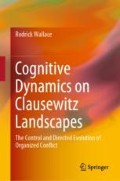Abstract
Conflict between cognitive institutions on a Clausewitz landscape dominated by friction and the fog-of-war enters the same realm of difficulty as confronts and afflicts the study of consciousness in higher animals (e.g., [1,2,3,4], and references therein). Cognitive submodules of institutions and higher animals become linked, at different scales and levels of organization, in tunable, dynamically shifting coalitions in response to signals arising from both internal crosstalk and external “sensory” sources. The formal description of consciousness remains highly contentious and appears to require mathematical tools familiar to the far outlands of string theory.
Access this chapter
Tax calculation will be finalised at checkout
Purchases are for personal use only
References
Baars, B. 1988. A cognitive theory of consciousness. New York: Cambridge University Press.
Wallace, R. 2005. Consciousness: A mathematical treatment of the neuronal global workspace model. New York: Springer.
Wallace, R. 2012. Consciousness, crosstalk, and the mereological fallacy: An evolutionary perspective. Physics of Life Reviews 9: 426–453.
Wallace, R. 2017. Computational Psychiatry: A systems biology approach to the epigenetics of mental disorder. New York: Springer.
Watts, B. 2008. US Combat training, operational art, and strategic competence: Problems and opportunities. Washington, DC: Center for Strategic and Budgetary Assessments.
Wallace, R. 2010. Expanding the modern synthesis. Comptes Rendus Biologies 333: 701–709.
Wallace, R. 2011. A formal approach to evolution as a self-referential language. BioSystems 106: 36–44.
Wallace, R. 2014. A new formal perspective on ‘Cambrian Explosions’. Comptes Rendus Biologies 337: 1–5.
Wallace, R., and D. Wallace. 2008. Code, context and epigenetic catalysis in gene expression. Transactions on Computational Systems Biology XI, LNBI 5750: 283–334.
Wallace, R., and D. Wallace. 2016. Gene expression and its discontents: The social production of chronic disease, 2nd ed. New York: Springer.
Bracken, P. 2006. Net assessment, a practical guide, Parameters. Springer, 90–100.
von Clausewitz, C. 1989. On War, Howard, M., P. Paret (eds.), Princeton University Press, Princeton, NJ.
Lykke, A. 1989. Defining military strategy. Military Review 2–8.
Beyerchen, A. 1992. Clausewitz, nonlinearity, and the unpredictability of war. International Security 17: 59–90.
Tse-Tung, M. 1963. Selected military writings of Mao Tse-Tung. PRC: Foreign Language Press.
Wallace, R. 2015. An ecosystem approach to economic stabilization: Escaping the neoliberal wilderness. New York: Routledge.
Krepinevich, A., and B. Watts. 2009. Retaining strategic competence. Washington, D.C.: Center for Strategic and Budgetary Assessment.
Krepinevich, A., and B. Watts. 2009. Lost at the NSC, The National Interest 99: 63–72.
Armed Conflict Working Group. 2013. Armed Conflict: A model for understanding and intervention. Death Studies 37: 61088.
Author information
Authors and Affiliations
Corresponding author
Rights and permissions
Copyright information
© 2020 Springer Nature Switzerland AG
About this chapter
Cite this chapter
Wallace, R. (2020). Final Remarks. In: Cognitive Dynamics on Clausewitz Landscapes. Springer, Cham. https://doi.org/10.1007/978-3-030-26424-6_13
Download citation
DOI: https://doi.org/10.1007/978-3-030-26424-6_13
Published:
Publisher Name: Springer, Cham
Print ISBN: 978-3-030-26423-9
Online ISBN: 978-3-030-26424-6
eBook Packages: Political Science and International StudiesPolitical Science and International Studies (R0)

